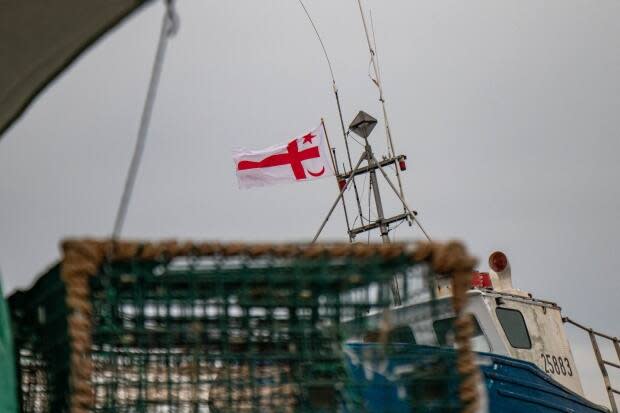Mi'kmaw First Nation 'very positive' about federal fishery talks

The latest meeting between the Sipekne'katik First Nation and federal fisheries staff involved the band going over the details of their moderate livelihood fishery on Tuesday.
Chief Mike Sack said the talks were "very positive" and he is optimistic about how things are going.
"It's just to help them completely understand where we're coming from with it and to answer any concerns they might have," he told reporters in Digby, N.S.
Sack said the meeting did not involve Fisheries Minister Bernadette Jordan, but that if they feel it would be helpful to have her physically at the table they will ask.

The next meeting with fisheries staff is set for next Monday, Sack said.
The Department of Fisheries and Oceans (DFO) has had the fishery plan for some time now and has a good sense of what it entails, Sack said. But, he said their band has a few factors they are looking to iron out at the wharf, like catch amounts.
"We don't have all of our data yet," Sack said, "So you know, our future conversations will be about moving forward with this together."
When Sack was asked about the recent criticism Jordan has faced in Ottawa over her handling of the situation, he said they have come a long way, "government to government."
He added he was "delighted" that Jordan mentioned the importance of upholding First Nations' treaty rights during question period on Monday.
Sipekne'katik launched what the band calls a self-regulated lobster fishery at a wharf in Saulnierville, N.S., on Sept. 17 — 21 years after the Supreme Court ruling in the case of Donald Marshall Jr.
The landmark decision affirmed the Mi'kmaq right to earn a "moderate livelihood" from fishing. The court later said the federal government could regulate the Mi'kmaw fishery, but must justify any restrictions it placed on it.
After more than a week of tension, confrontations with commercial fishermen in the area have eased recently.
The First Nation's fishery in St. Marys Bay continued through the weekend and on Monday the fleet was expanded from seven to 10 boats, creating a total capacity of 500 traps. That's about the same capacity as two large commercial boats.
But selling a catch without DFO approval requires a provincial government rule change, and so far Premier Stephen McNeil is staying out of the situation.
He said the moderate livelihood still has to be officially defined by DFO.
"Until the national government who has charge of the fishery can come to a resolution with the Mi'kmaw nation and commercial fisheries, we don't have something to respond to because we don't know what the change would look like," McNeil told reporters Tuesday.
Sack said they have had some back and forth with the province about a possible meeting and while nothing is confirmed yet, "we're looking to get in right away."
Many commercial lobster fishermen have said they consider the new Sipekne'katik fishery in St. Marys Bay illegal and worry that catching lobster outside the mandated season, particularly during the summer spawning period, will negatively impact stocks.
A fleet of commercial vessels removed 350 Mi'kmaw lobster traps from the water on the weekend of Sept. 19 to 20.
But one Dalhousie University professor who studies fisheries management has said the Mi'kmaw fishery won't harm lobster stocks given its small scale.
The Mi'kmaw fleet has been able to continue working over the past few days without arguments on the wharf with commercial fishers, their lines being cut, or other intimidation tactics that Sack said he'd heard about when the fishery launched.
"We're very grateful … we're not here to fight with anyone. We're here to do what we feel is right," Sack said. "I'm glad that the confrontations are over and hopefully they're completely done with."
In light of this change, the Assembly of Nova Scotia Mi'kmaw Chiefs reduced their state of emergency over the matter to a state of readiness and closed their incident command centre, according to a release Tuesday.
The situation in the Digby area will still be monitored by the assembly and their staff and if it escalates again or community members require more support, they will reopen the command centre.
MORE TOP STORIES


